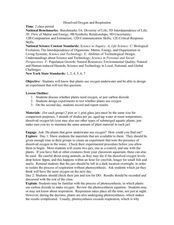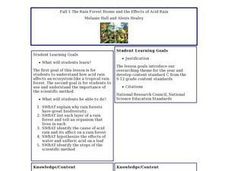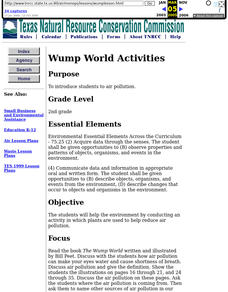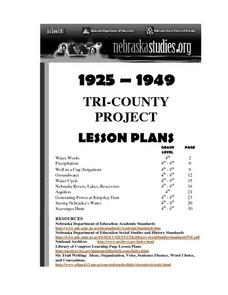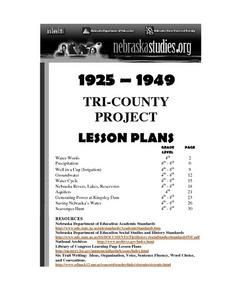Florida Department of Environmental Protection
Build Your Own Aquifer
Ever wondered how an aquifer works? Introduce your class to the amazing way many people get water by exploring how underground aquifers work. Two fun hands-on activities are used to help kids understand what an aquifer is, how it works,...
Curated OER
Dissolved Oxygen and Respiration
Students are presented with the question, "Do plants that grow underwater use oxygen?" They create an experiment to test the presence of dissolved oxygen in the water using provided materials. Student experiments include a control jar as...
Curated OER
Tides in the Hudson
Students view an illustration of the Hudson River watershed and identify the bodies of water shown. They discuss what happens when fresh and salt water mix. Students view a teacher demonstration of the stratification of fresh and salt...
Curated OER
Conductivity - Pass the Buoy and Pepper, Please
Buoys around our coastlines are equipped with sensory devices which monitor temperature, salinity, and water pressure. Emerging earth scientists examine some of this data and relate salinity to the electrical conductivity of the surface...
Curated OER
Digital Video Lesson Plan: Brine Shrimp
Learners participate in classroom experiment to gain better understanding of type of environment brine shrimp can best survive. Students then explore effects of common saltwater pollutants on survival of animals in sea.
Curated OER
Aquatic Science
What a terrific way to explore the pond habitat! Learners discuss the animal and plant life found in the Long Island area. They also discuss vocabulary terms, identify pollution concerns, and resource conservation.
Curated OER
Erosion
Fifth graders engage in some activities that will help them to identify erosion and explain the causes of erosion. They also look into ways that humans can slow the process of erosion in some cases. After a teacher-led demonstration,...
Curated OER
The Marvels of Mud
Young scientists roll up their sleeves and get a little dirty in this three-day earth science investigation. Following the scientific method, children monitor the growth of algae in pond water samples in order to determine the role that...
Georgia Aquarium
The Ocean's Nursery
Linear perspective, estuaries, and water ways converge in a science-inspired art project. The class uses what they've learned about eco-systems, estuaries, and the food chain to create scale models of a local marsh. While the lesson is...
NOAA
Ocean Geologic Features
Sediment samples from the ocean bottoms tell scientists about climate change, pollution, and changes in erosion for the area. Groups of learners focus on sediments and their movement through water. During a hands-on activity, they...
Curated OER
Fall 1-The Rain Forest Biome and the Effects of Acid Rain - Biology Teaching Thesis
Students explain why rain forests have great biodiversity, and list each layer of a rain forest and tell an organism that lives in each. They identify the cause of acid rain and its affect on a rain forest. Students hypothesize the...
Curated OER
The Chemistry of Refining Crude Oil
Consider our energy sources: wood, coal, oil, uranium. Learners compare the pollution to energy produced for each. They practice fractional distillation of an alcohol/water mixture to simulate the process of refining crude oil....
Redefining Progress
Have and Have-Not
Is there a correlation between a country's wealth and the extent of its ecological footprint? What exactly constitutes an ecological footprint, and how does one country stack up against the rest? This is a unique instructional activity...
Curated OER
Wump World
Second graders read ead the book The Wump World written and illustrated by Bill Peet. Discuss with the students how air pollution can make your eyes water and cause shortness of breath. Students discuss air pollution and give the...
Curated OER
Current Events and Fish
Fifth graders examine current events impacting aquatic life in their communities. They search for newspaper, magazine and television reports for information about aquatic life in local bodies of water. Students can write letters to...
Curated OER
Subsurface Contamination of Groundwater
Students evaluate the potential problems associated with underground storage tanks. They research the potential hazards from various subsurface pollutants and simulate a superfund site cleanup.
Curated OER
"Tri-County" Project--Well in a Cup
Students construct a model of a well to identify how water is brought to the surface. Signs of pollution are investigated.
Curated OER
Geography Action! Rivers 2001- Human River
Students create a 'human river' by arranging themselves into a river pattern. Each student selects an article to represent a pollutant such as paper, book, or pencil. Students at the source of the river pass their pollutant on to the...
Curated OER
"Tri-County" Project--Ogallala Aquifer
Students explore the Ogallala Aquifer in the state of Nebraska. The signs of pollution found are examined and the data classified.
Curated OER
Particulate Matter: The Lorax
Students collect air samples to test it for air pollution. They are read the story The Lorax and discuss the effects of air pollution. They share their observations with the class.
Curated OER
It's Not My Problem!
Young scholars examine how rivers flow through the country to sea level. Students study how upstream pollution effects the water and people downstream.
Curated OER
The Air We Breathe
Students discover the cuases of pollution. They investigate different pollutants that exist. Stsudents research technologies developed by engineers to reduce the amounts of air pollution. Upon completion of assigned activities,...
Curated OER
What's Hiding in the Air?
Fifth graders conduct experiments to study the effects of invisible air pollutants including one with a bean plant. They examine methods of invisible air pollutants.
Curated OER
You are the Microbiologist
In this lesson plan, students demonstrate comprehension of basic lab techniques by properly using these techniques in preparing a laboratory investigation, demonstrate synthesis of prior lab experiences by solving a new problem using...
Other popular searches
- Water Pollution Worksheets
- Water Pollution Experiments
- Air and Water Pollution
- Sources of Water Pollution
- Air Water Pollution
- Water Pollution Lesson Plans
- Water Pollution Activity
- Bacterial Water Pollution
- Water Pollution Works
- Water Pollution Lesson
- Water Pollution Oil Spills
- Types of Water Contamination



